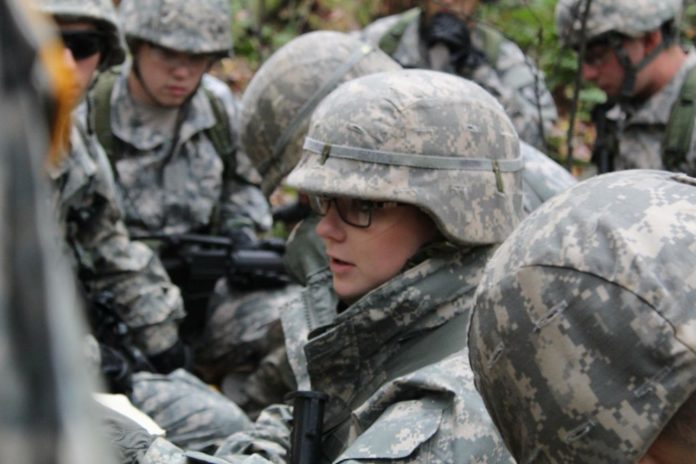For many college students, the question of they will be doing after graduation seems either impossible to answer or too frightening to think about. For two Army ROTC seniors that questions is not only already answered, but they will be doing something no other Slippery Rock student in their position has done.
Seniors Isti Istrefi and Rachel Brobeck recently received the news that, upon graduation, they will be commissioned into the Field Artillery. Istrefi and Brobeck will be the first two women from SRU to serve in a combat speciality since the ban on women in combat roles was lifted in January of 2016.
ROTC cadets across the country are ranked based on their GPA, extra curricular activities and physical fitness scores, and based on their ranking are chosen to go into active duty or not. Those chosen for active duty are able to make a list ranking where they would like to go in the Army. Both Istrefi and Brobeck ranked high enough to be chosen for active duty, and both had field artillery as their number one choice.
Brobeck, a criminal justice major and leadership minor, is something of a legacy cadet at SRU as her father, Michael Brobeck, was a part of the first ever SRU ROTC class, commissioning as an engineer in 1984 and graduating in 1986.
A native of Burkke, Virginia, Brobeck said her father was a big influence as to why she came to Slippery Rock and why she decided to join the ROTC program.
“I followed exactly in (my dad’s) footsteps and he’s very enthusiastic about that,” Brobeck said. “Originally I had planned to do the exact same branch as him, but last second I switched and decided to go combat arms. He was happy, but he was also hesitant.”
After being able to job shadow a field artillery unit over the summer, Brobeck decided to change her desired assignment from engineer.
“I felt like this is what I want to be doing, I want to be fast-paced,” Brobeck said. “I guess I would just feel like I wasn’t living to my full potential if I settled for engineer because that was just what I knew.”
Brobeck said that her father has his reservations about her entering a “man’s world” and having to face the challenges that will come with that, but that he is also very proud and always enthusiastic.
While also being assigned to field artillery, Istrefi said she eventually hopes to transition into military intelligence. A self-proclaimed “military brat” Istrefi’s father was also a member of the military and she moved between various military bases her entire life. Istrefi said that her father initially pushed for her to join ROTC in college and join the military, but when she was nearing the end of high school he eventually backed off.
“Once my senior year (of high school) hit, I don’t know if (my father) got scared or something, but he really did not want me to join the Army. He was like ‘don’t do third because of me, do this because you want to do it’,” Istrefi said.
A fellow criminal justice major, leadership minor, Istrefi attended the same summer program as Brobeck, however she shadowed a transportation unit. She said that she did not feel passionate enough about the company she was with, which is why she eventually gravitated towards field artillery.
“I wanted to do more, and that’s when I went and I spoke to a female field artillery officer and she just had really great things about it,” Istrefi said. “She said it would be challenging and that my best option, if I was on the fence, would be to put in for a branch detail.
With a branch detail, Istrefi’s main branch will be military intelligence, but she will commission into a field artillery detail. As a lieutenant she will serve as a field artillery officer, then when she makes captain she will be able to either go into military intelligence or stay in field artillery.
Istrefi and Borbeck both said that they plan on making the military their full careers and hope to be able to look back with no regrets about the choices they have made.
Captain Joseph Barrow, an assistant professor of military science, said that it was a brave choice for each of them to want to go into field artillery.
“They are going into branches that are traditionally male,” Barrow said. “They might reports to units where they are the first females. They are going to be groundbreaking. They’re going to be breaking the glass ceiling, destroying stereotypes.”
“It’s exciting and relieving to know what we’re going to be doing after we graduate, but it is really exciting also to know that we are the first to be out there and make a name for women and our school,” Brobeck said. “It was exciting (finding out their assignment) but also kind of shocking at the same time. I wasn’t really expecting it.”








